Rock climbing can be a thrilling and challenging sport that pushes you both physically and mentally. However, if you’re a beginner, it can also be intimidating to figure out where to start. That’s why we’ve put together 13 essential tips to help you get started on your rock climbing journey.
From proper gear and equipment to basic techniques and safety measures, our tips will provide you with the knowledge and confidence you need to climb with success. We’ll cover important topics like footwork, hand placement, breathing techniques, and body positioning, all of which are crucial for mastering the basics of rock climbing.
We’ll also discuss the importance of warming up, stretching, and staying hydrated, as well as the benefits of practicing with a climbing partner or taking a lesson from a professional instructor. Whether you’re climbing in a gym or in the great outdoors, these tips will help you stay safe and have fun while challenging yourself to new heights.
So, if you’re ready to take on the thrilling and rewarding sport of rock climbing, read on to learn the 13 essential tips for beginner climbers.
1. Invest in good quality climbing gear
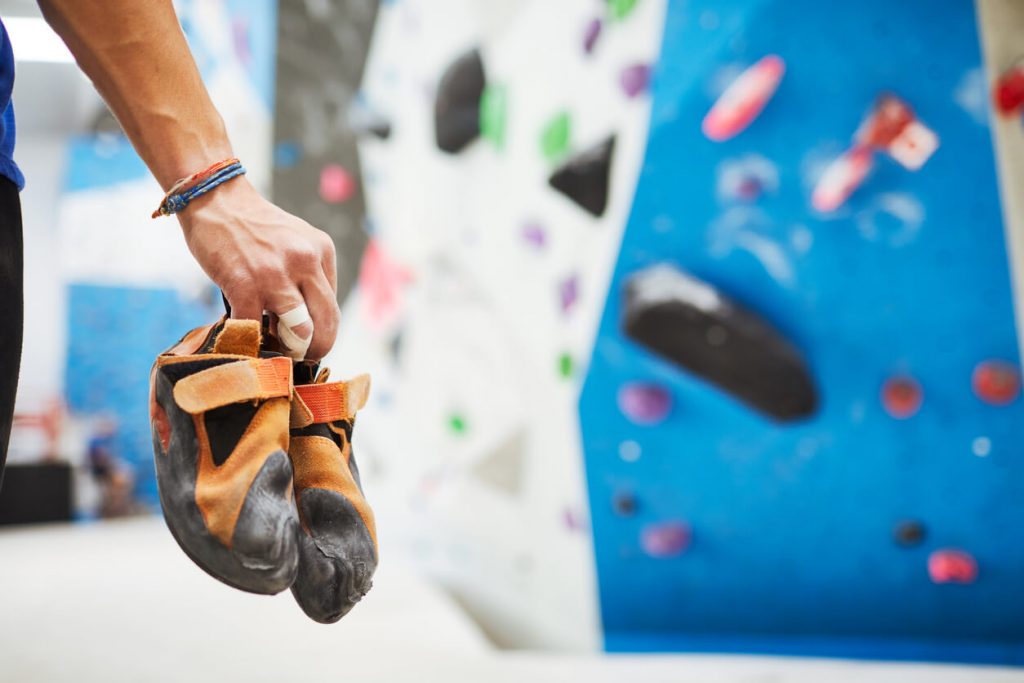
It might sound obvious, but if you’re serious about becoming a competent climber, you need to invest in good equipment.
Not only can wearing unsuitable clothing and footwear put you at greater risk of injury, but renting out new gear every time you go climbing will cost you a fortune.
Although it might seem expensive to begin with, good quality gear will prove much more beneficial long term – especially if you plan on climbing regularly.
Don’t get carried away, though – as a beginner, you don’t need everything. The following items are the most essential:
- Beginner climbing shoes
- Chalk and chalk bag
- Sport climbing harness
- Sport climbing belay device
- Sport climbing carabiner
- Helmet
Other equipment like crash pads, ropes, and quickdraws will become more necessary as you gain further rock climbing experience.
2. Get an instructor
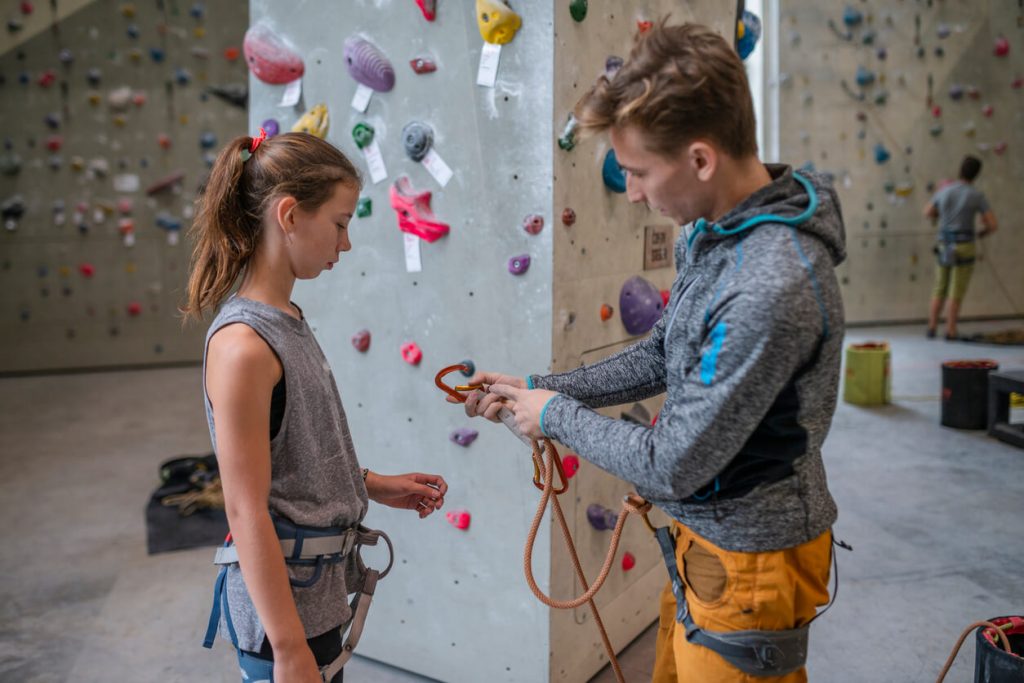
One of the most important rock climbing tips for beginners is to learn from the best.
When starting out, there are so many new techniques to learn. The only way you can be sure you’re absorbing everything is to get face-to-face with someone who knows what they’re talking about.
There are numerous ways you can do this.
If you live near, or can easily travel to, a climbing gym, they’re a great place to start. If you can find someone to train with who’s a qualified rock climbing instructor, you’re in luck. Likewise, if they’re a member of a reputable organization like the British Mountaineering Council, this shows how passionate and knowledgeable they are about rock climbing.
3. Find a climbing partner
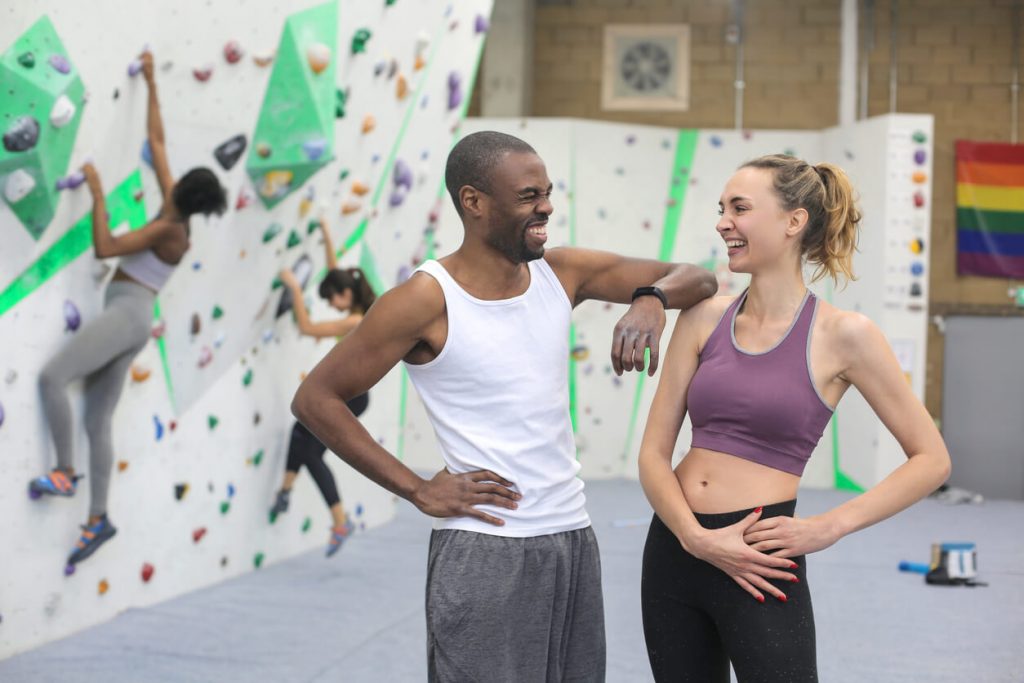
As the famous song goes, ‘I get by with a little help from my friends.’
Rock climbing is no different, and another important tip for beginners is to buddy up with a partner in climbing – pun intended. They might not be an instructor, but they’ll be able to support you in your first few climbs and pass on vital instructions.
The more technical term for this person would be your belay partner. As you become a more confident climber, your belay partner will stay on the ground to hold your rope and catch your falls.
But, when you’re first starting out, climbing in pairs is a great way of maintaining your motivation and can add a competitive edge to spur your progress.
4. Get a basic understanding of climbing grades
Put simply, climbing grades are either a number or number-letter combination designed to reflect the difficulty of a climb.
There are numerous grading systems, all of which will probably confuse you at first, but a good instructor will be able to talk you through them.
Climbing grades originate from extreme mountaineering, in which safety is paramount. When you’re first starting out in an indoor gym, however, grades are used mainly to compare each climbing wall – so understanding them will definitely help.
Don’t focus too much on grades, though. Some climbers make the mistake of thinking they aren’t progressing if they’re not ‘moving up’ them, which isn’t necessarily true.
Measure your progress on whether you feel more confident than you did the previous week – this is far more important than grades.
5. Try not to do too much, too soon
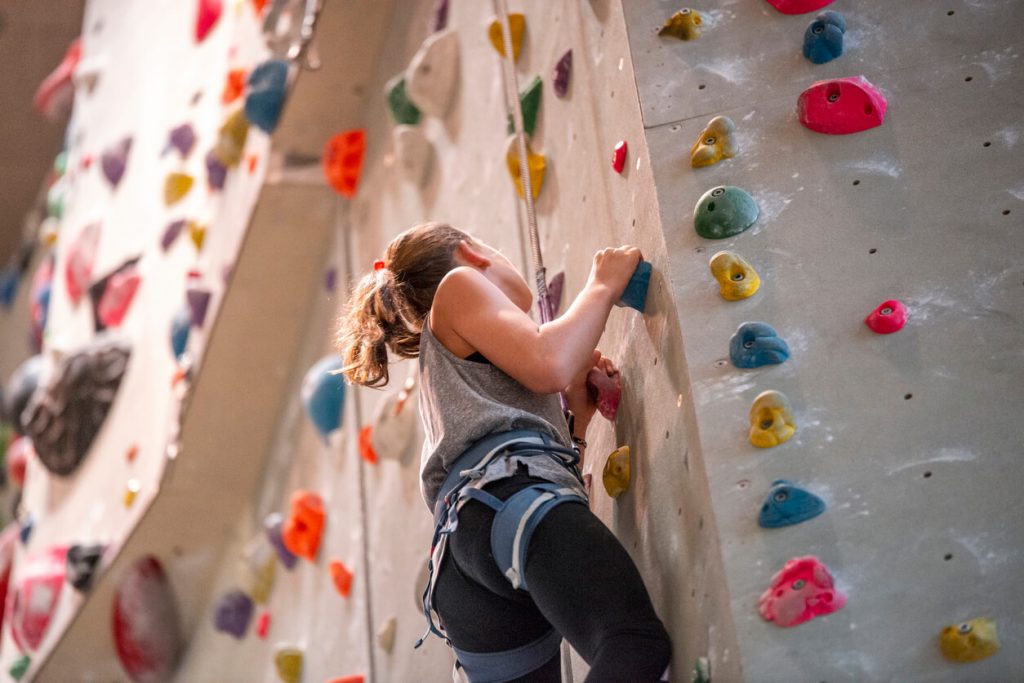
Make no mistake – rock climbing is hard. One of the biggest mistakes you can make as a beginner is to rush into things and expect instant results. Instead of learning and developing at their own pace or taking things one step at a time, many beginner rock climbers treat climbing like a sprint, often disregarding technique and skill. If it takes you longer to reach the summit than someone else, that’s fine. Trust the process, and don’t be too hard on yourself. Don’t feel pressured into climbing every day, either. Around two or three sessions a week is the recommended amount of rock climbing time for beginners. Any more than that, and you risk fatigue and potential injury.
6. Practise the ‘silent feet’ method
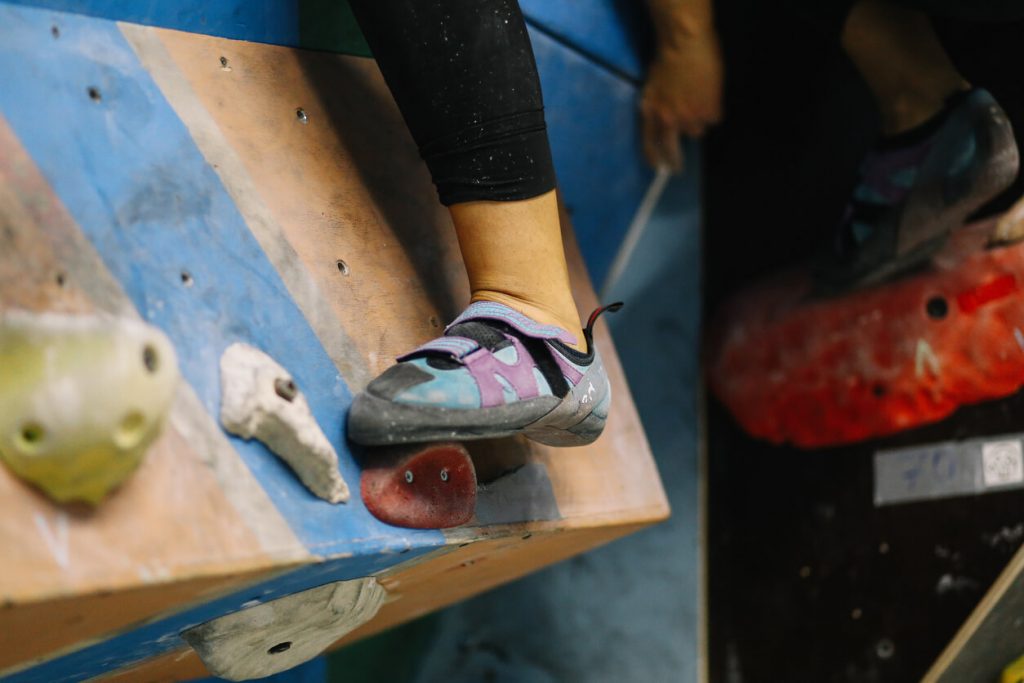
On your first climb, your footwork will be terrible. Don’t beat yourself up over it – everyone’s footwork is.
This is because, at first, most people make the mistake of just looking upward while climbing, not paying any attention to their feet.
However, practicing the ‘silent feet’ method is one of the best ways you can start to improve your technique. Yes, it’s as simple as it sounds.
While climbing, try to make as little noise as possible when you place your feet on the footholds – ideally, it should be silent.
Though it sounds simple, it means you’ll start paying a lot more attention to your footwork – which is one of the most invaluable rock climbing tips for beginners.
Related: Tips for Better Climbing Footwork
7. Attend a professional event as a spectator
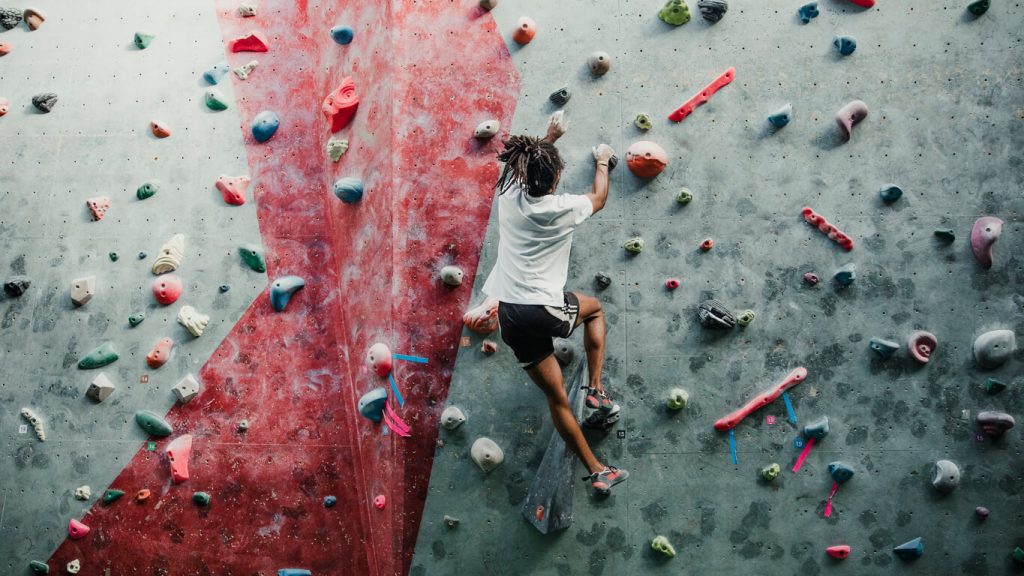
Just as a good instructor will guide and support you through the nitty-gritty, professional climbing events will give you a firsthand glimpse of how the experts do it.
Go armed with a notepad, pen, and camera, and take it all in. Absorb the atmosphere, admire the technique on display, and get inspired.
Attending these events also allows you to meet like-minded people and expand your climbing community.
Who knows – you might even find yourself a new partner in climb (which is important for beginners, as we covered above).
8. Practise falling off
As a rock climber, you’re going to fall off. It’s inevitable – so you might as well master the art.
All successful climbers spend time purposely falling to learn how to do so correctly. You need to do the same – practicing falling off will limit your chances of getting injured when it happens for real.
Your instructor will guide you through this properly, but here are some key pointers to remember:
- If you’re using a rope, make sure it stays in front of your feet at all times during your climb – getting it tangled could cause you to flip upside down when you fall.
- Communicate clearly with your belay partner before coming off the wall.
- Don’t push yourself off the wall with extreme force – you’ll swing right back and collide with it at speed, which will hurt.
The fall itself can be broken down into three parts, too. These are:
1. Coming off the wall
2. Falling
3. Landing
9. Remember to keep your arms straight
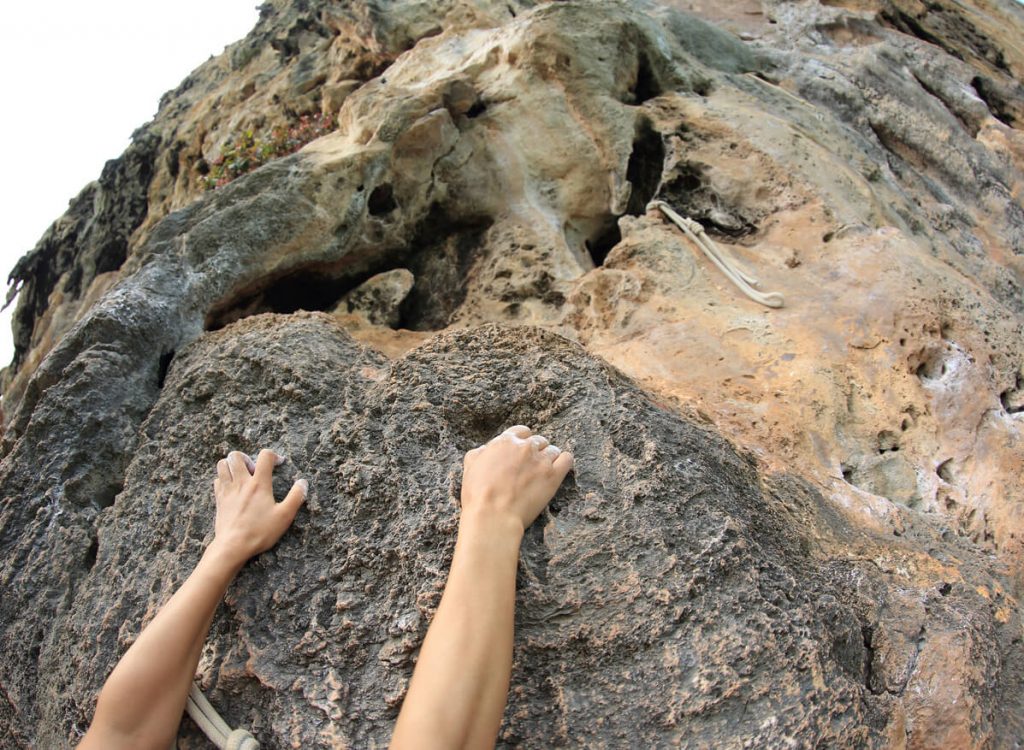
Keeping your arms straight is arguably THE most important rock-climbing tip for beginners.
Climbing with bent arms can impact your performance in numerous ways. For a start, it’s often a sign that your arms are supporting your body weight far more than they need to, which means you’ll tire a lot quicker. And let’s face it, getting tired easily is very demotivating, especially as a beginner.
Also, when you bend your arms, you’re also restricting your reach, which can make climbs seem harder than they actually are.
Though it’s a simple technique on paper, climbing with straight arms is vital. Think about when you’re carrying shopping home – are your arms normally straight or bent? Ask yourself why.
10. Work on your core
Most people think that to be a successful rock climber, you need some serious upper-body strength to pull you upwards.
Well, perhaps surprisingly – your core strength is much more important.
So, if you’re au fait with activities like yoga, gymnastics, or pilates, this is bound to give you a leg up on the climbing wall (pun, once again, intended).
And even if you’re not, there are lots of easy ways to engage your core, both at the gym and at home.
11. Warm up properly
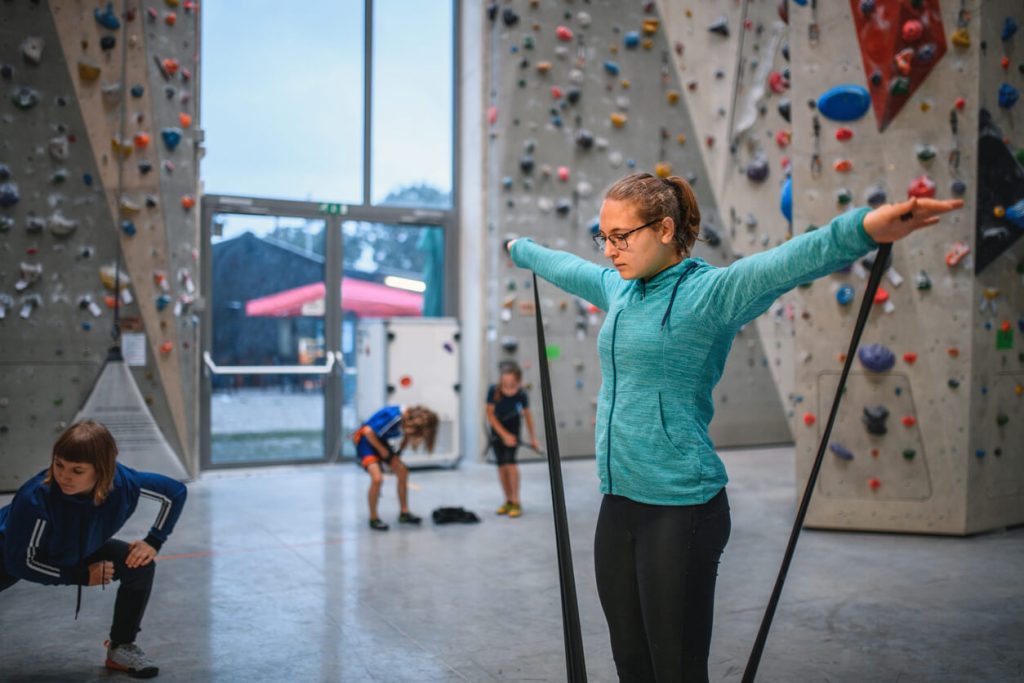
As with other sports, rock climbing requires a proper warm-up if you want to avoid serious injury. And yet, so many of us disregard this essential part of climbing.
Get into good habits early on, and make sure you include a good, regular warm-up routine in your climbing preparations.
Try a mixture of jumping jacks, leg swings, arm and wrist circles, lunges, squats, and push-ups –anything that loosens you up and makes you feel alert.
You don’t need to go over the top, though – ten minutes is plenty for a warm-up.
12. Be mindful of your nutrition

Look at any seasoned rock climber and you’re likely to see a toned, muscular, healthy-looking physique – but it doesn’t happen by chance. Take Chris Sharma for example.
The sheer strength and endurance involved in rock climbing mean you burn a lot of calories doing it, so it’s important to refuel your body with the right things.
As a beginner, break things down into three parts.
Before a climb –it’s good to eat a variety of healthy fats such as avocado and nuts, carbohydrates, and proteins.
During a climb – quick sugars from energy bars will keep your energy levels up.
After a climb – refuel with and proteins complex carbohydrates like brown rice and potatoes. The protein in particular will aid muscle recovery.
Related: Nutrition Essentials for Climbers
13. Remember to have fun
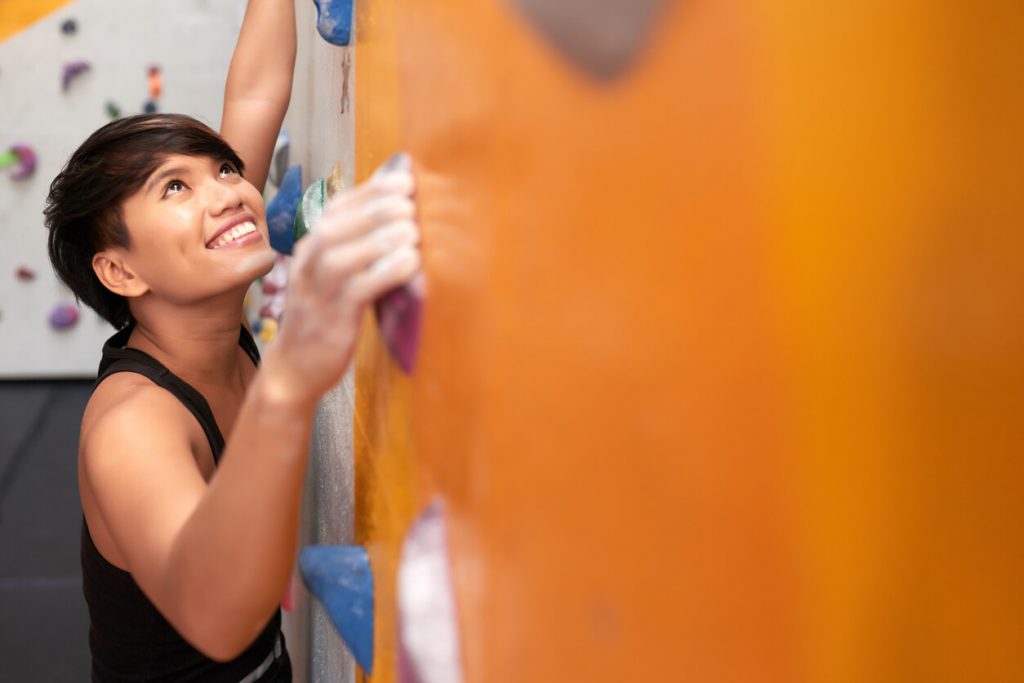
It’s easy to get bogged down in seriousness, gym etiquette, and overthinking your technique. But let’s not forget, rock climbing is meant to be fun, exciting, and sociable.
As a beginner, never lose sight of the reason you first started. Treat climbing like a game, to begin with, and if you find yourself getting frustrated, simply step away and take a break.
Having fun will make you a more competent climber in the long run, which is why you started reading this blog in the first place, right?
Related: 7 reasons why rock climbing is fun
Specialist rock climbing insurance from Insure4Sport
It doesn’t matter whether you’re a complete beginner or an experienced pro, rock climbing always carries a risk of injury, and your equipment could be lost, damaged or stolen, too.
Before you do anything, you need specialist rock climbing insurance to protect you and ensure you won’t be left out of pocket should the unexpected happen.


